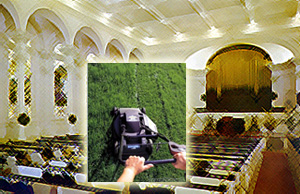Page 1 Page 2 Page 3 Page 4 Page 5

2
Early June during my high school years was a time between things. I was not a child now; I was not an adult. No more high school, no more Sunday School until after Labor Day. What would I do in my free time? At fifteen, I was too old to ride my bicycle around town and too young for a New Jersey driving learner’s permit. I was also jobless but expected to “chip in around the house and yard,” as my mother and father expressed it. “Keep those leg and arm muscles strong for football try-outs,” Dad urged me one Saturday morning and pointed to the yard rake and push mower in the garage.
“Get a power mower like Mr. Outerbridge,” I replied.
“I —” he began but stopped. He stepped toward me, cocked his head, and placed his hands on his hips. His dark brown eyes challenged me as he asked, “How do you know Ed Outerbridge has a power mower?”
“I went by Ledden’s the other day,” I said, referring to Lorrence’s lawn and garden products store. “I saw him and one of the Ledden guys put the mower in Mr. Outerbridge’s pick-up.”
My father narrowed his eyes and looked out at the yard. He nodded as if he agreed with the event I had just described, and then he said, “Ed doesn’t need a power mower. His yard’s not that big… He had a pick-up, too? Was anybody else with him?”
“No.”
“You’re sure?”
“Yeah, I’m sure. Why?”
“Nothing,” he said.
By my mid-teens I had learned implications of my father’s “Nothing” to me. “Nothing” implied he dismissed the subject with a wave of his hand or the turn of a newspaper page in order to move on to matters more interesting. “Nothing” also implied he wanted more information about the subject before he would agree or disagree. On this June Saturday, Dad followed the second implication. His dark eyes slid away from mine to our garage’s cinder floor. He spoke abruptly, as if preoccupied with more serious matters. “The grass is a little high. You might as well get started on it now. I sharpened the blades, so they should cut pretty well.”
“Wanna toss a few?” I asked him, trying to lighten his mood. “I’ll get the football. I’ll be able to push the mower better after I loosen my arm.”
He smiled. “Just a few.”
Air currents within a house change according to subjects of conversation. How the day went, plans for dinner with friends create mild air within rooms. Who’s having “trouble” stirs uncertain air.
Still, the afternoon sun through kitchen windows highlights white enamel of door and window frames, coats a dusty shine to ivy and Christmas cactus leaves on windowsills. Cabinets are opened and closed with snug pulls and pushes. Chairs slide against the floor without interference. Words may be few, their meanings simple: “I’ve got the directors’ meeting tomorrow,” my father would say, referring to the Lorrence National Bank Board of Directors meeting he was required to attend. “I’ll be late for dinner.”
“Maybe we should eat downtown?” my mother would ask.
I was always included in my parents’ use of “we.” One June thunder-showery evening that summer, when I met them at their favorite downtown restaurant, I feasted on a hot roast beef sandwich, fries, and cole slaw, all washed down with iced tea. On our way out, we said hello to Dr. and Mrs. Wilson. After initial greetings and pleasantries, the professor glanced at me, adjusted his rimless glasses, leaned toward my parents and said, “That matter we talked about the other day? Things are not well.”
The pleasant air shifted to uncertain.
My mother turned to me and said, “You go on. We’ll meet you outside. Here, take my umbrella.”
“I don’t need it,” I said, since in my adolescent point of view the use of an umbrella another sign of being a sissy.
Dr. Wilson dabbed his mouth with a napkin and waved a dismissive hand at me. “Misfortunes of the adult world, David. I’ll send your parents out to you in short order. Nice to have seen you, yes.”

